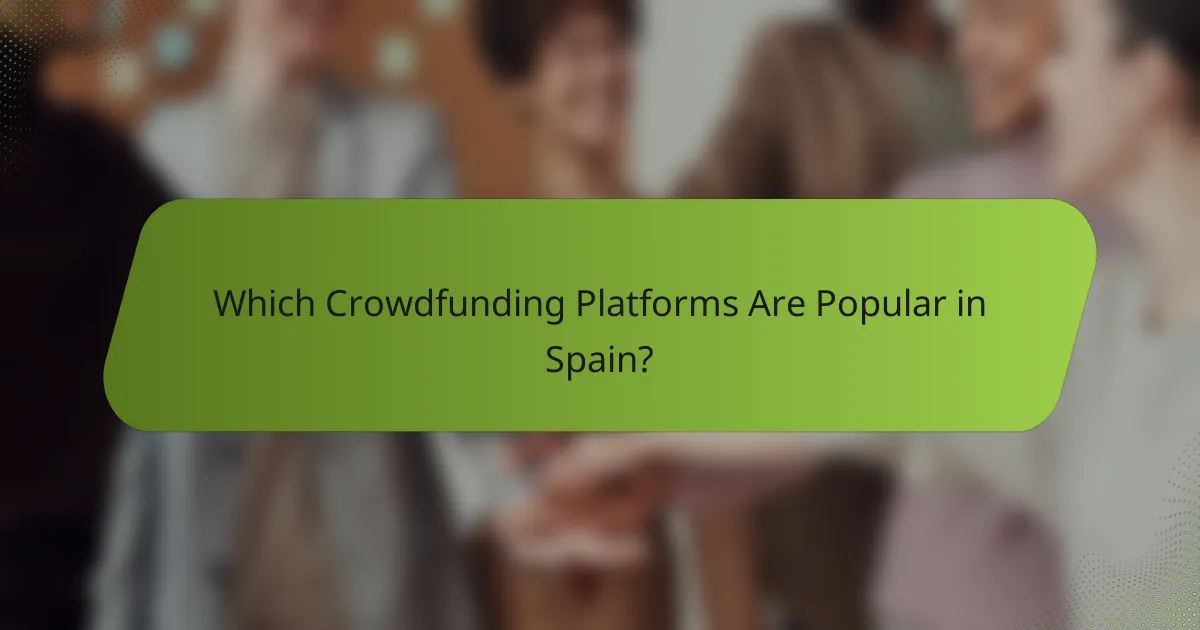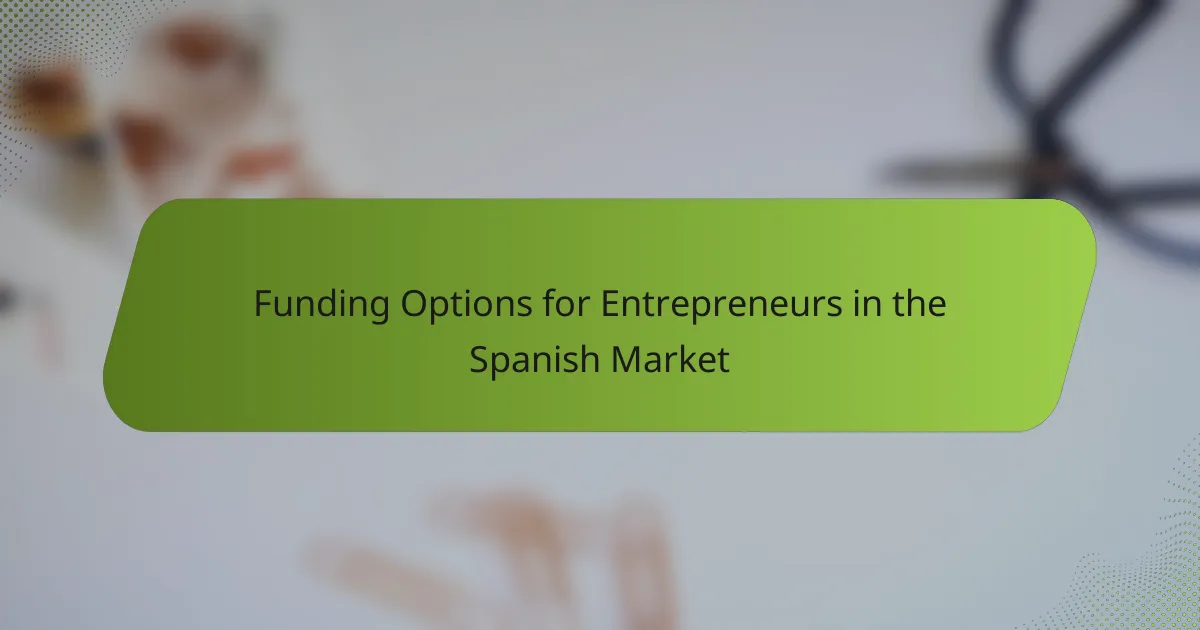Entrepreneurs in Spain have access to a variety of funding options tailored to their specific needs and business stages. From government grants that encourage innovation without the burden of repayment to venture capital that demands a solid business model and growth potential, understanding these avenues is essential for securing the necessary financial support.

What Are the Best Funding Options for Entrepreneurs in Spain?
Entrepreneurs in Spain have several viable funding options to consider, each with unique benefits and challenges. The best choice depends on the business model, stage of development, and specific financial needs.
Venture Capital Firms
Venture capital firms provide significant funding to startups in exchange for equity. In Spain, these firms often focus on technology and innovative sectors, making them ideal for high-growth potential businesses.
When seeking venture capital, entrepreneurs should prepare a solid business plan and a compelling pitch. It’s crucial to understand that these firms typically look for a substantial return on investment, which may lead to pressure for rapid growth.
Angel Investors
Angel investors are individuals who invest their personal funds into startups, usually in exchange for convertible debt or ownership equity. They often provide not only capital but also mentorship and networking opportunities.
Finding angel investors in Spain can be facilitated through local networks and startup events. Entrepreneurs should be ready to demonstrate their business’s potential and how they plan to use the investment effectively.
Government Grants
The Spanish government offers various grants and subsidies to support entrepreneurship, particularly in innovation and technology. These grants do not require repayment, making them an attractive option for startups.
To apply for government grants, entrepreneurs must meet specific criteria and submit detailed proposals. It’s advisable to research available programs through the Instituto de Crédito Oficial (ICO) and local business development agencies.
Crowdfunding Platforms
Crowdfunding platforms allow entrepreneurs to raise small amounts of money from a large number of people, typically via online platforms. This method is gaining popularity in Spain, especially for creative projects and social enterprises.
Successful crowdfunding campaigns often require a compelling story and effective marketing. Entrepreneurs should set realistic funding goals and offer attractive rewards to backers to encourage contributions.
Bank Loans
Bank loans are a traditional funding option for entrepreneurs in Spain, providing capital that must be repaid with interest. These loans can be secured or unsecured, depending on the business’s creditworthiness and collateral.
When applying for a bank loan, entrepreneurs should prepare comprehensive financial statements and a clear repayment plan. It’s essential to shop around for the best interest rates and terms, as these can vary significantly between banks.

How Do Spanish Government Grants Work?
Spanish government grants provide financial support to entrepreneurs to foster innovation, job creation, and economic growth. These grants typically do not require repayment, making them an attractive funding option for startups and small businesses.
Types of Grants Available
In Spain, various types of government grants are available, including those focused on research and development, technology adoption, and business expansion. Some grants are region-specific, while others are national initiatives aimed at promoting entrepreneurship across the country.
Common examples include the CDTI grants for technological innovation and the European Regional Development Fund (ERDF) grants, which support projects in less economically developed areas. Additionally, there are grants specifically targeting women entrepreneurs and youth-led startups.
Eligibility Criteria
Eligibility for Spanish government grants often depends on several factors, including the type of business, its size, and the project’s objectives. Generally, small and medium-sized enterprises (SMEs) have a higher chance of qualifying, particularly if they demonstrate innovation or job creation potential.
Applicants typically need to provide a detailed project proposal, financial forecasts, and evidence of their business’s viability. It’s essential to review specific grant requirements, as some may require co-financing or adherence to particular regulations. Common pitfalls include incomplete applications and failure to meet deadlines, which can result in disqualification.

What Are the Requirements for Securing Venture Capital?
To secure venture capital, entrepreneurs typically need a compelling business model, a strong team, and a clear growth strategy. Investors look for potential returns, so demonstrating market demand and scalability is crucial.
Business Plan Essentials
A solid business plan is fundamental for attracting venture capital. It should clearly outline your business model, target market, competitive landscape, and financial projections. Including a detailed market analysis can help investors understand the potential for growth and profitability.
Consider including key metrics such as customer acquisition costs, lifetime value, and projected revenue streams. A well-structured plan typically spans 15-30 pages and should be concise yet comprehensive, allowing for quick understanding.
Pitch Deck Components
Your pitch deck is a visual representation of your business plan and should effectively communicate your value proposition. Essential components include an overview of the problem you’re solving, your solution, market opportunity, business model, and financial projections. Aim for around 10-15 slides to keep it focused and engaging.
Additionally, include information about your team and their relevant experience, as well as your go-to-market strategy. Visuals, such as graphs and charts, can enhance understanding and retention, making your pitch more impactful.

Which Crowdfunding Platforms Are Popular in Spain?
In Spain, several crowdfunding platforms are gaining traction among entrepreneurs seeking funding. These platforms offer diverse options for raising capital, each with unique features and target audiences.
Kickstarter
Kickstarter is a well-known platform that focuses on creative projects, making it ideal for entrepreneurs in the arts, technology, and design sectors. Projects typically need to meet a funding goal within a specified timeframe, or they receive no funds.
To succeed on Kickstarter, entrepreneurs should create compelling project descriptions, engaging videos, and attractive rewards for backers. It’s common for projects to raise anywhere from a few thousand to several hundred thousand euros, depending on the idea’s appeal and marketing efforts.
Indiegogo
Indiegogo offers more flexibility than Kickstarter, allowing entrepreneurs to choose between fixed and flexible funding options. This means that even if a project does not meet its goal, the entrepreneur can still keep the funds raised under the flexible model.
This platform is suitable for a wide range of projects, from innovative tech gadgets to community initiatives. Entrepreneurs should focus on building a strong community and promoting their campaigns through social media to maximize their chances of success.
Ulule
Ulule is a popular crowdfunding platform in Europe, particularly in Spain and France, known for supporting creative and community-driven projects. It emphasizes the importance of community engagement and often features projects that aim to have a positive social impact.
On Ulule, entrepreneurs can set funding goals and offer various rewards to backers. Successful campaigns often highlight their social value and engage potential backers through storytelling. Projects can range from a few hundred to tens of thousands of euros, depending on their scope and appeal.

How to Choose the Right Funding Option?
Selecting the right funding option is crucial for entrepreneurs in the Spanish market. It involves understanding your business needs, evaluating available funding terms, and considering the implications of each option on your growth and financial health.
Assessing Business Needs
Begin by clearly defining your business needs, including the amount of capital required and the purpose of the funds. Consider whether you need funding for startup costs, operational expenses, or expansion projects. This clarity will guide you toward the most suitable funding sources.
Evaluate the urgency of your funding needs. If you require immediate capital, options like short-term loans or crowdfunding might be more appropriate than equity financing, which often takes longer to secure. Assessing your timeline will help prioritize your choices.
Evaluating Funding Terms
Once you identify potential funding sources, closely examine their terms. Look for interest rates, repayment schedules, and any equity stakes involved. Understanding these terms will help you gauge the long-term impact on your business.
Compare different funding options side by side. For instance, a bank loan might offer lower interest rates but require collateral, while venture capital may provide larger sums without immediate repayment but could dilute your ownership. Weigh these trade-offs carefully to find the best fit for your situation.
